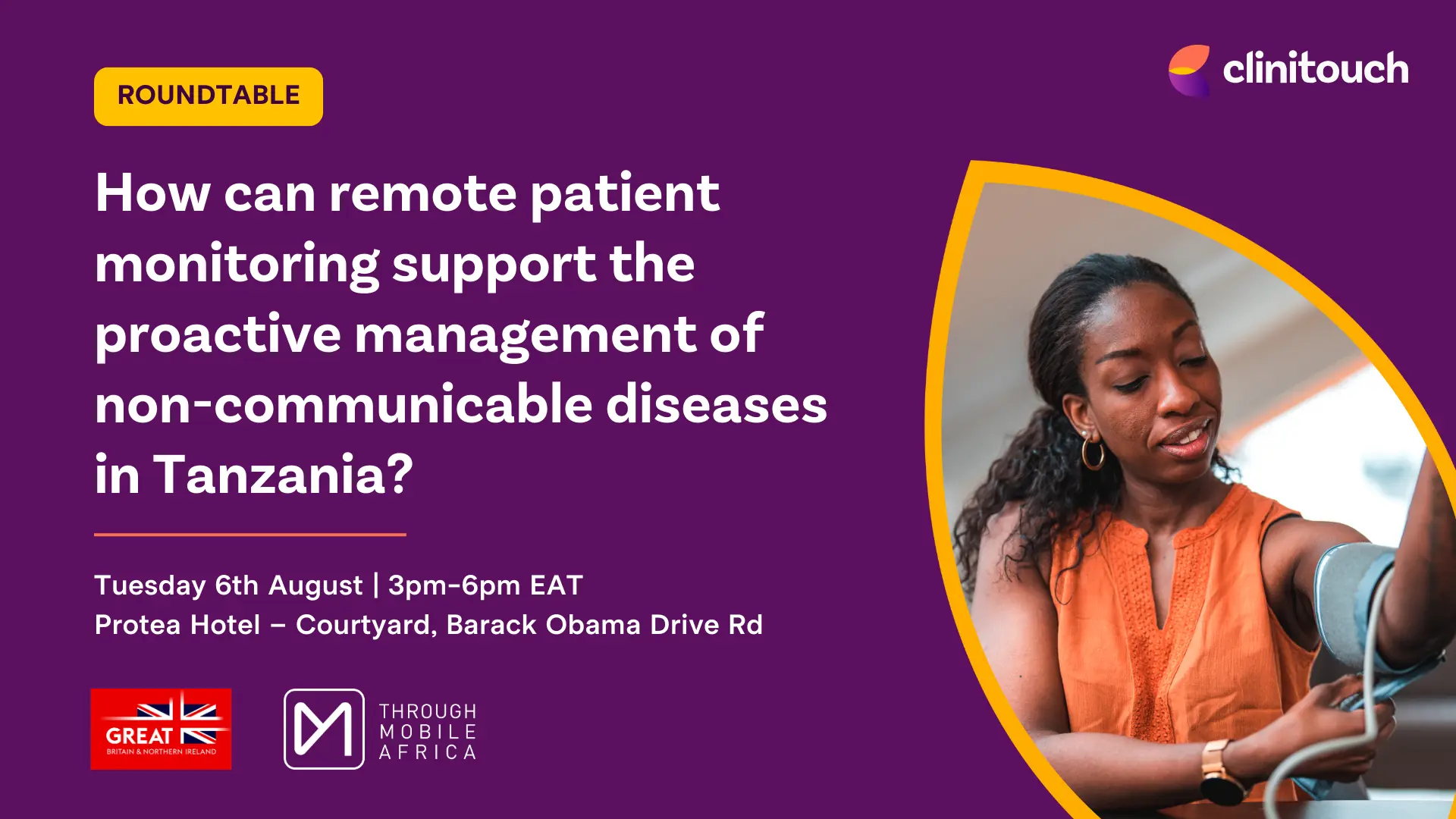Roundtable: How can remote patient monitoring support the proactive management of non-communicable diseases in Tanzania?

Join us for an in-person roundtable in partnership with the UK Government’s Department for Business and Trade and Clinitouch’s Tanzanian partner, Through Mobile Africa.
Places are limited - register now.
- Date: Tuesday 6th August 2024
- Time: 3pm-6pm EAT, with the roundtable starting at 3:30pm
- Location: Protea Hotel – Courtyard, Barack Obama Drive Rd, Upanga East – Sea view
- Refreshments: Light food and drink will be provided, with an opportunity for networking and a Q&A.
Understanding the need
Non-communicable diseases (NCDs) pose a major health problem in Tanzania. With 497 deaths out of every 100,000 being attributed to NCDs, it is clear there is a need to better manage patients with these conditions. But how can this be done when, like many nations, Tanzania faces the challenge of stretched clinical resources?
Our roundtable focus
We will show how an innovative health technology deployed widely in the UK’s NHS and several pilots across Africa, can help to:
- Increase access to quality healthcare by connecting patients to their clinical team remotely, reducing the need to travel a long way for frequent clinic visits
- Improve clinical capacity by prioritising urgent cases, preventing unnecessary complications or deterioration
- Efficiently and effectively manage people in Tanzania with NCDs, using data from our in-house Health Economist to discuss current healthcare challenges in Tanzania and how Clinitouch can be used to solve them
Speakers include:
- Noel O’Kelly, Ex NHS Medical Director with over 25 years of clinical experience & Co-Founder of Clinitouch
- Godfrey Lwakatare, Trade Adviser – Agritech/Blue Economy Lead Department for UK Government’s Department for Business and Trade
- Abraham Mwapongo, Commercial Director at Through Mobile, a Clinitouch partner in Tanzania
- Bruce Adams, Commercial Director at Clinitouch
Why attend?
This session will provide a deeper understanding of how you can utilise remote patient monitoring technology in your region to better manage patients with NCDs. Plus, you will be able to ask our speakers any questions and have the opportunity for networking with individuals interested in transforming Tanzanian healthcare.
Simply register your interest by filling out our form.
What is remote patient monitoring?
Remote patient monitoring is a way for healthcare teams to track and manage patients' health conditions from any location. Patients use devices such as Clinitouch to combine patient health questionnaires and vital signs monitoring such as blood pressure and oxygen saturation to measure their health data at home. This data is then sent to their healthcare team, who can monitor their condition, provide guidance, and intervene with treatment sooner where necessary, all without the patient having to visit the clinic or hospital.
The Clinitouch platform is backed by proven successes in the UK’s NHS for over a decade and is now being used to power several digital health projects across the globe including South Africa, Namibia and Ghana.
Roundtable: How can remote patient monitoring support the proactive management of non-communicable diseases in Tanzania?

Join us for an in-person roundtable in partnership with the UK Government’s Department for Business and Trade and Clinitouch’s Tanzanian partner, Through Mobile Africa.
Places are limited - register now.
- Date: Tuesday 6th August 2024
- Time: 3pm-6pm EAT, with the roundtable starting at 3:30pm
- Location: Protea Hotel – Courtyard, Barack Obama Drive Rd, Upanga East – Sea view
- Refreshments: Light food and drink will be provided, with an opportunity for networking and a Q&A.
Understanding the need
Non-communicable diseases (NCDs) pose a major health problem in Tanzania. With 497 deaths out of every 100,000 being attributed to NCDs, it is clear there is a need to better manage patients with these conditions. But how can this be done when, like many nations, Tanzania faces the challenge of stretched clinical resources?
Our roundtable focus
We will show how an innovative health technology deployed widely in the UK’s NHS and several pilots across Africa, can help to:
- Increase access to quality healthcare by connecting patients to their clinical team remotely, reducing the need to travel a long way for frequent clinic visits
- Improve clinical capacity by prioritising urgent cases, preventing unnecessary complications or deterioration
- Efficiently and effectively manage people in Tanzania with NCDs, using data from our in-house Health Economist to discuss current healthcare challenges in Tanzania and how Clinitouch can be used to solve them
Speakers include:
- Noel O’Kelly, Ex NHS Medical Director with over 25 years of clinical experience & Co-Founder of Clinitouch
- Godfrey Lwakatare, Trade Adviser – Agritech/Blue Economy Lead Department for UK Government’s Department for Business and Trade
- Abraham Mwapongo, Commercial Director at Through Mobile, a Clinitouch partner in Tanzania
- Bruce Adams, Commercial Director at Clinitouch
Why attend?
This session will provide a deeper understanding of how you can utilise remote patient monitoring technology in your region to better manage patients with NCDs. Plus, you will be able to ask our speakers any questions and have the opportunity for networking with individuals interested in transforming Tanzanian healthcare.
Simply register your interest by filling out our form.
What is remote patient monitoring?
Remote patient monitoring is a way for healthcare teams to track and manage patients' health conditions from any location. Patients use devices such as Clinitouch to combine patient health questionnaires and vital signs monitoring such as blood pressure and oxygen saturation to measure their health data at home. This data is then sent to their healthcare team, who can monitor their condition, provide guidance, and intervene with treatment sooner where necessary, all without the patient having to visit the clinic or hospital.
The Clinitouch platform is backed by proven successes in the UK’s NHS for over a decade and is now being used to power several digital health projects across the globe including South Africa, Namibia and Ghana.



%20(1).png)
.png)

